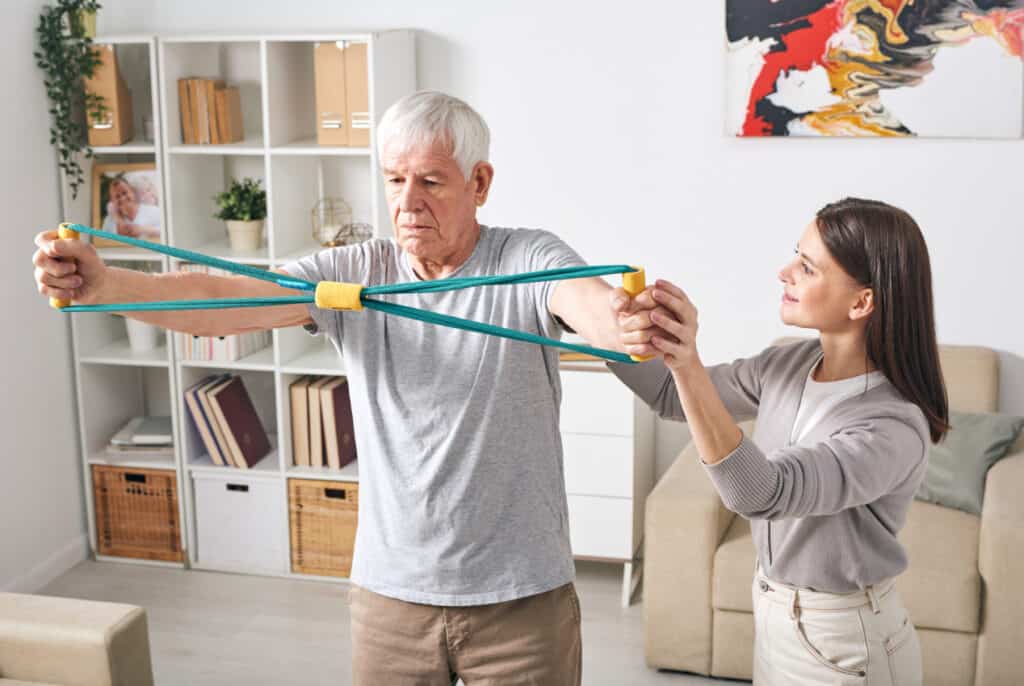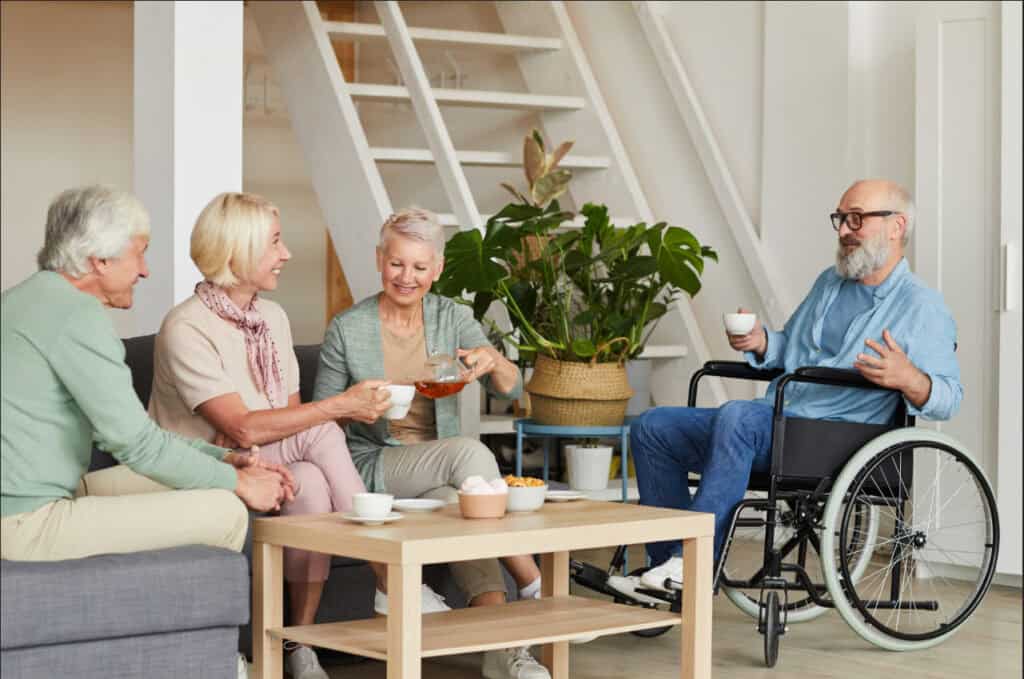The stress of senior isolation and loneliness has always been a major concern in long-term care.
In 2020, the issue became especially prevalent, but isolation and loneliness can have detrimental effects on the elderly, even in the best of times. As adults get older, many have fewer and fewer social ties or opportunities to build social connections. Here’s how senior care professionals can help.
If you work in senior care, you know that staff is often on the frontline in fighting the stress of senior isolation and loneliness. Sometimes your team will be the main point of contact and socialization for your residents. In 2020, the issue of elderly isolation became extremely prominent.
Now, as we move forward, many of the elderly will still experience the stress of senior isolation. Family and friends may be eager to reconnect with loved ones at first. But after a while, schedules fill up, and life goes on. Those in long-term care can be forgotten or overlooked.
Applying many of the best practices for combating senior loneliness that we learned over the pandemic, here’s how senior care staff can keep encouraging seniors to build those valuable social ties and essential connections.
Impacts of Social Isolation on Senior Health
Loneliness and senior isolation aren’t new issues for seniors. In fact, long before the days of COVID-19, studies showed that loneliness was increasing, and seniors were feeling more stress from isolation. Some of it is due to the busy lives of friends and family. Some are due to a longer lifespan, resulting in people who may outlive their social connections. Compounding the problem, seniors often feel behind on technology and other methods of creating social connections.
As Baby Boomers start to trickle into the senior population, we’re seeing more people choosing to age-in-place, especially in their early retirement years. While staying in their homes can be great for independence, there are benefits of senior living that they miss out on. A big part of that is social connection.
Experts have linked isolation and fewer social connections with various health-related conditions, including an increased risk for chronic illness, psychiatric disorders, and more. Experts consider social isolation and loneliness to be risk factors for premature death—similar to smoking, lack of physical activity, and obesity.
As people in other circles emerge from “social distancing,” seniors may feel like they don’t have as much to emerge to. Many of their friends and peers have been hardest hit by the pandemic. Friends and family members may visit, but it can be hard to get back those connections after the distance. Many seniors who were already suffering from anxiety and depression may have seen them exacerbated over the last year and a half of stress.
Seniors must get plenty of social interaction, no matter their age or health. It’s those social ties that keep them engaged and connected to the world around them. Those ties will help them stay healthy, cognitively alert, and living longer, happier lives.
10 Ways Senior Care Staff Ease the Stress of Isolation
The staff of long-term care and senior living facilities have always been creative and caring when it comes to finding ways to help seniors adapt to life at the facility. Whether it’s scheduling activities to help seniors stay active or finding creative ways to help them connect with the larger community, senior care staff often go above and beyond.
If your team members are looking for ways to help residents struggling with the stress of senior isolation and loneliness, here are 10 ways to ease the challenge.
1. Set Daily Goals
It’s very easy for days to feel monotonous and everything to run together when you don’t have a good routine in place. But achieving small goals, like getting dressed, making breakfast, filling in a crossword puzzle can impact the whole outcome of your day. Staff can also identify seniors who might be struggling by paying attention to those who show less interest in their usual pastimes.
As a staff, help residents set mini goals and figure out what they want to achieve for the day. Assist them with exploring online classes, new books, puzzles, and games. Many organizations like zoos, museums, and national parks share content on their websites so people can “explore” from afar. Plan a “day trip” to the Grand Canyon or visit the Louvre on a Tuesday and then complete a puzzle on Thursday. Following a schedule with mini-goals will help seniors feel grounded and have a sense of purpose.
2. Stay Active

Never underestimate the positive effect exercise can have on your mental state. Whether seniors participate in group exercise classes or individual activities with physical therapists as part of their wellness plan, movement keeps you connected and healthy.
Yoga and tai chi can be great activities for seniors. They don’t require special equipment, and instructors can easily adapt them for different abilities and experience levels. Walking around the neighborhood or even through the courtyard of your facility can also help seniors get fresh air, connect with nature, and feel more engaged with the world around them.
3. Be Aware of Risk Factors
Seniors with chronic health conditions or with a history of anxiety or depression may be more likely to experience the effects of isolation and loneliness. Those who have experienced the loss of a spouse, friend, or close family member may be going through grief and feeling alone.
Staff should be cognizant of which residents might be experiencing these feelings more acutely. These folks might need a gentle push or extra encouragement to join in on group activities or even open up about their concerns. There are tools to help older adults self-screen for certain risk factors for depression and anxiety. The AARP Foundation’s Connect2Affect tool allows adults to assess their risk for isolation-related stress.
4. Take Field Trips
New experiences help us stay engaged and connected to the outside world. Studies show that our brains form new neuropathways when we have new experiences (at any age). For those in senior care, the days can often follow a set pattern, where they seem to merge endlessly into one another. Staff can help seniors branch out and shake things up by offering off-site activities.
Drive to a nearby park or walk around the neighborhood. Offer movie nights, different activities, and opportunities to socialize and have fun with other residents. Activities outside the norm can help seniors regain a zest for life and a brighter outlook.
5. Encourage Kindness

One way that humans connect is through acts of kindness. When we do things for others, we get a boost to our sense of wellness. We feel more connected and positively about other people. Acts of kindness even help give us a greater sense of purpose.
For seniors in long-term care, they may not have as many opportunities to do things for others, leading to greater feelings of isolation, worthlessness, and depression. Offer older adults a chance to do little acts of kindness at the facility. Ideas could include helping them make cards for each other, write messages of encouragement, or help each other during activities.
6. Accept Assistance
Volunteer programs, pet-therapy programs, and other activities can be vital to senior residents’ wellbeing. If some of your regular visitation programs have fallen by the wayside, it’s a great time to send out a call to your local volunteer hub, neighborhood group, or Facebook page, asking for people to lend a hand.
Many people outside of senior care are also feeling the effects of loneliness and isolation. They may be eager to help by offering to call residents, drop off activities and supplies, bring pets for window visits, and more. Get creative to keep those community ties strong.
7. Encourage Peer-to-Peer Friendships
Many of those in senior care may feel isolated when their neighbors right next door are feeling the exact same way. Encourage seniors to make connections by hosting get-to-know-you events and social activities. Group walks, weekly classes, cafeteria meals, or movies can all help seniors get to know each other and make friends in the facility.
Like anyone in a new situation, seniors may feel shy. They may not know how to reach out or find commonalities with their neighboring residents. Hosting different activities—music, art, movement, and more, can help them find those shared-interests so they can make more friends.
8. Use Technology…with Discretion

Technology is an essential part of keeping seniors connected. FaceTime, Zoom, Skype, and other programs help everyone see face-to-face, even from a distance. For seniors facing isolation and loneliness, technology can be a welcome way to visit with loved ones.
For many seniors, though, technology can be overwhelming. It’s important that staff understands this and works to help them access tech comfortably and safely. Many seniors can be targeted for fraud, identity theft, and other concerns. Be sure that staff is available to help residents make the most of technology as a tool for combating the stress of senior isolation.
9. Take a Break from the Outside World
It may sound counterintuitive, but when you’re working to ease the stress of senior isolation, encourage them to take a break from watching the news. Older adults are typically heavy viewers of local and national news. Staying informed is essential, but too much exposure can add unnecessary anxiety and worry.
If staff notice seniors getting too fixated on media, encourage them to take a break or engage in an alternative healthier activity. Many excellent programs like seated fitness, arts and crafts, decorating, and cooking can provide seniors with a welcome escape. When the creative side of their brains is engaged, they’ll feel less worried about the stressors of the world.
10. Prioritize Talk
Your facility may or may not have an on-site mental health professional, but regardless, the value of “talk therapy” is significant. Staff can provide a listening ear and support peer-to-peer friendships and conversations.
For those who are really struggling, many therapists now offer telehealth appointments. Virtual therapy can feel a little strange at first, but for convenience, it’s unparalleled. Once patients get started, they may even prefer the ease of video chatting with a mental health professional. Talking about feelings makes them much more manageable and helps residents feel connected and heard.
The stress of isolation for seniors is very, really, and very concerning, but with some wise efforts, your staff can put seniors at ease. Everyone, regardless of age, gets lonely. When you help to foster human connections, all participants will enjoy better health.